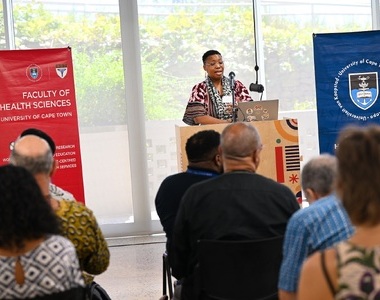Body donor programme fit and well despite COVID-19
22 December 2020 | Story Helen Swingler. Photo Michael Hammond. Read time 5 min.
Thanks to rigorous COVID-19 health and safety protocols, the University of Cape Town’s (UCT) Faculty of Health Sciences has maintained its body donor programme without risking staff or students. The programme is essential to teaching anatomy and new surgical techniques. Globally, the pandemic has forced many health sciences faculties to close their programmes.
Body donations to UCT allow its physiotherapy, occupational therapy, science and medical students, including surgeons from various disciplines, to experience hands-on dissection and practise new surgical techniques.
Associate Professor Delva Shamley, the head of the Division of Clinical Anatomy and Biological Anthropology in the Department of Human Biology, said that as a result UCT has been able to maintain practical teaching programmes in line with the level of lockdown. Michael Cassar, the chief technical officer, led and implemented the health and safety procedures in the faculty mortuary, where donated bodies are stored.
“Our students won’t lose the privilege of learning anatomy from these ‘silent teachersʼ. ”
“Our students won’t lose the privilege of learning anatomy from these ‘silent teachersʼ,” Associate Professor Shamley said.
“Learning about the human form is an honour and a privilege and one which is only possible because of our ‘silent teachersʼ. The appreciation and respect for their contribution to our learning is never more evident than at the dedication ceremony, where our students’ humility and thanks emerge [in] song, poetry and dance. A beautiful African tradition.”
Irreplaceable teaching
Not even the advent of virtual teaching and sophisticated multimedia models can replace the value of dissecting cadavers, said the department’s Dr Geney Gunston.
“Dissection is a rite of passage, introducing students to the concepts of life and death, which they are expected to deal with compassionately as professionals. Dissection allows students to see, feel and explore structures such as tendons, nerves, fascia and vessels, and introduces them to the variability of the human body and the uniqueness of each donor.”
In a recent letter to the dean of the Faculty of Health Sciences, Professor Lionel Green-Thompson, Professor Johannes Fagan (Division of Otorhinolaryngology) highlighted the irreplaceable value of the body donor programme. Professor Fagan paid tribute to Cassar and his team who manage the body donor programme. They have made important contributions to surgical training at UCT, Fagan wrote.
“Other surgical disciplines also make use of cadaveric material for surgical training.”
“This has become even more relevant with COVID-19 having delayed many surgical operations and reduced surgical training opportunities,” said Fagan. “The Department of Human Biology makes skeletal material available to our registrars to learn and perfect their otology surgical skills in our lab in the Groote Schuur Hospital Old Main Building.”
Fagan said that they were also able to run training courses for registrars on sinus surgery at the Red Cross War Memorial Children’s Hospital’s Surgical Skills Training Centre.
“Other surgical disciplines also make use of cadaveric material for surgical training,” he wrote.
“While such cadaver dissections do not fully mitigate the loss of surgery opportunities caused by COVID-19, they do go some way to compensate for the lack of surgery.”
Strict protocols
Cassar said that their already strict health and safety measures have been enhanced to ensure that all donor bodies received by the department were COVID-19 negative. The mortuary team have worked closely with hospitals, treating doctors and their contracted funeral undertakers to ensure this.
The Department of Human Biology’s database has approximately 2 800 donors but hopes to boost this. They plan to run an awareness campaign to inform the public of the body donor programme, said anatomy senior lecturer and neuroscientist Dr Adhil Bhagwandin. Dr Bhagwandin works with second- and third-year medical students and teaches health and rehabilitation students.
Memorialisation on video
However, one aspect of the programme that has been affected by COVID-19 is the department’s annual dedication ceremony to honour and thank the ‘silent teachers’ and their families. This ceremony is driven by second-year medical students.
This year the students’ contributions took the form of a video, said Bhagwandin. This will be hosted on the Division of Clinical Anatomy and Biological Anthropology’s website and will be distributed to students on Vula, the student learning portal.
“We hope that the video relays our sentiments of thanks and appreciation for the valuable learning experience made possible by the generosity of the donors.”
 This work is licensed under a Creative Commons Attribution-NoDerivatives 4.0 International License.
This work is licensed under a Creative Commons Attribution-NoDerivatives 4.0 International License.
Please view the republishing articles page for more information.






























































































































































































































































































































































































































































